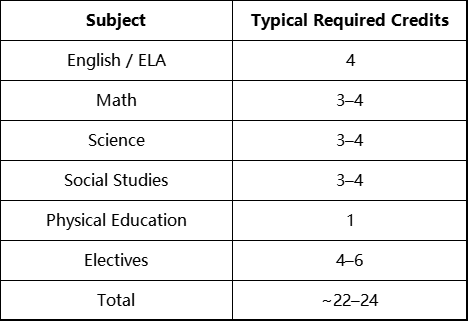What Are High School Credits? A Simple Guide for Students and Parents
If you’re navigating high school or planning for graduation, you’ve probably heard the term “high school credits” many times. But what are high school credits, and why are they important?
This article breaks down everything you need to know about high school credits — from how they work, to how many you need to graduate, and how they impact your future.

What Are High School Credits?
High school credits are units used to measure the completion of a course or subject. When a student successfully finishes a class — such as Algebra, English, or Biology — they earn a set number of credits.
Credits serve as a way for schools to track academic progress and determine whether students are meeting graduation requirements.
How Do High School Credits Work?
In most U.S. high schools, here’s how credit assignments typically work:
1.0 credit = Completion of a full-year course
0.5 credit = Completion of a one-semester course
0.25 credit = Short-term electives, PE, or workshops
For example, if you complete a year of English Language Arts, you’ll earn 1 credit toward graduation.
How Many Credits Are Needed to Graduate?
While requirements vary by state or school district, most students need between 18 to 24 total credits to graduate from high school. These usually include:

Check with your specific state or school program for exact credit requirements.
Why Are High School Credits Important?
High school credits do more than get you to graduation — they also:
- Determine your academic standing(freshman, sophomore, junior, senior)
- Affect your GPA and college eligibility
- Influence scholarship and financial aid opportunities
- Show colleges you’ve met academic standards
Credits also allow students to customize their education. You can take electives in art, business, or computer science to explore your interests or potential career paths.
Can You Earn High School Credits Online?
Yes! Many students earn credits through online high school courses, which are especially useful for:
- Credit recovery
- Flexible learning schedules
- Homeschooling
- Accelerated graduation
Make sure to choose accredited programs that are recognized by your state or school district.
Can You Transfer High School Credits?
In most cases, yes. Whether you’re moving schools or switching to an online program, you can usually transfer previously earned credits. However, credit transfer policies differ between schools, so always confirm with your guidance counselor or admissions office.
So, what are high school credits? They’re the building blocks of your academic journey, guiding you from freshman year to graduation day. By understanding how they work — and planning your courses strategically — you’ll stay on track and open doors to college, career training, and more.
If you’re unsure how many credits you have or need, don’t hesitate to speak with a school counselor.


